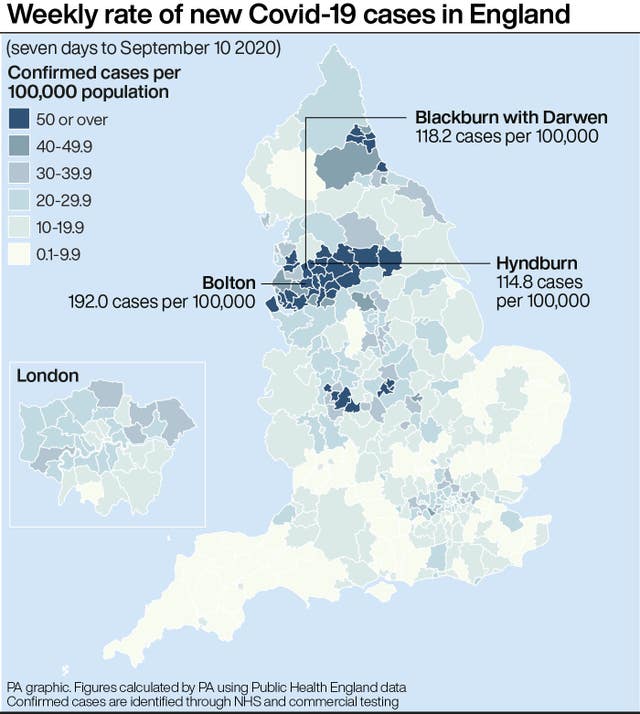NHS staff and patients ‘should be prioritised’ for Covid-19 tests
NHS Providers chief executive Chris Hopson said the NHS had been hit by staff being off work who were unable to get a test.

A “second wave” of Covid-19 has led to a surge in demand for tests, a professor advising the Government has said, as an NHS leader called for health workers and patients to be given priority.
Sir John Bell, regius professor of medicine at Oxford University, who has been advising ministers, said the speed at which more people would need tests had been underestimated and warned that the problem could get worse.
It comes amid signs of strain on testing capabilities causing large queues, people reporting they have been unable to get tests and others being offered tests hundreds of miles from their homes.
The problems are also contributing to staff absences, with some health workers having to self-isolate because they or members of their household are unable to get tests.
Sir John told BBC Radio 4’s Today programme: “I think what’s going wrong is the second wave.
“A month ago they had spare capacity in testing – significant spare capacity – but I think what has been underestimated was the speed at which the second wave would arrive, but also the pressure put on the system from children returning to school, and the testing demands associated with that, and people increasingly out and about.
“So, I think they are definitely behind the curve in terms of getting the necessary tests for what we need today.”
Sir John said there would be a “significant increase” in testing capacity over the next two weeks.

“But this will get worse because of course we haven’t hit winter yet – we haven’t all started to sniffle, get fevers, get colds, and that’s going to add additional confusion to the problem,” he added.
“The demand will go up. The real question is whether they can get supply in a position where it can outpace demand, and that’s the challenge at the moment.”
NHS Providers chief executive Chris Hopson said the health service in England had been hit by staff being off work who were unable to get a test.
He said the health service “simply can’t spare members of staff waiting for tests, not being able to come into work” and patients unable to be tested.
“There is a significant impact and a growing impact on the NHS, and that is a problem,” he added.
“Nobody knows how widespread this problem is, nobody knows how long it’s going to go on for, nobody knows, for example, given that there are scarcities of tests, about who’s going to be prioritised for those tests that are available.”
Mr Hopson urged the Government “to be honest and open” about what was going on, and said NHS staff and patients should be given priority for testing.
He told Today: “If you have got a demand-capacity mismatch, what you need to do is, kind of, prioritise really clearly, in terms of work out who should have greatest access to tests.
“Now, clearly from the NHS’s point of view we would want to have our staff tested and we would also want to have our patients who are needing treatment. They are the people who are the real priorities.”
Referring to general NHS activity, he added: “We have now got cases where patients who should be being treated, we can’t treat them because they can’t get access to a test.
“So, for them that’s a real problem.”
Professor Alan McNally, director of the institute of microbiology and infection at the University of Birmingham, who helped set up the Milton Keynes Lighthouse Lab, told BBC Breakfast there were “clearly underlying issues which nobody wants to tell us about”, plus a surge in demand for tests.
“I think there is a surge in demand (and) I think our stated capacity is very different from actually how many tests can be run in a given day,” he said.
“It’s very worrying that we seem to be in a situation before really we’ve come into autumn and winter where we’ve maxed out the number of tests we can do in the country, and that is very concerning.”
But he said a surge in demand for tests “was always going to happen at this time of year”.
He added: “Anyone with a child will tell you that respiratory infections peak as schools go back in September.

“The worry is that we are not getting clear information on where the problems are and it seems that there’s been a lack of foresight and planning for this to occur.”
The British Medical Association’s council chairman said that despite the Government’s ambitious Operation Moonshot plan for millions of UK tests to be carried out daily, the focus must be on the testing system currently in place.
In a speech to the doctors’ union’s annual meeting on Tuesday, Dr Chaand Nagpaul said: “The Government is now shooting for the moon promising to deliver mass continuous testing with a test that doesn’t yet exist at a cost nearly as much as the total NHS budget.
“Down here on Planet Earth, we need a fit for purpose test and trace system in the here and now with capacity, agility and accessibility that doesn’t require 100-mile journeys that disadvantage some of the most vulnerable.”
Health Secretary Matt Hancock admitted last week that there had been “challenges in access to tests” but insisted that “the vast majority of people get their tests rapidly and close to home”.
Residents in Bolton, where the infection rate is the highest in England, have complained of long delays in trying to book a test and in some cases being offered appointments in other areas of the UK.
Council chiefs have urged the Government to treat “major flaws” with the online booking system for tests as “a matter of the utmost priority”.
Home Secretary Priti Patel told BBC Breakfast it was “unacceptable” that some people were struggling to get tests, and “much more work needs to be undertaken with Public Health England”.
She said more testing slots and home testing kits were being made available and the “majority of tests” were available within a 10-mile radius.





